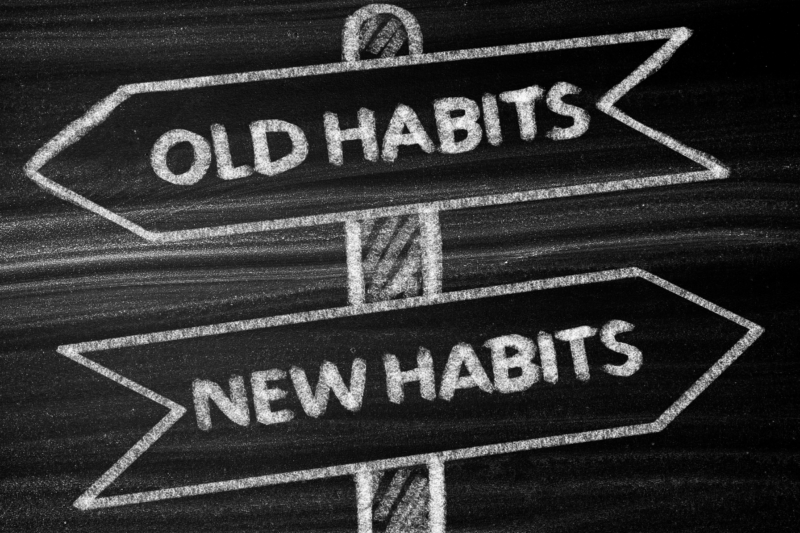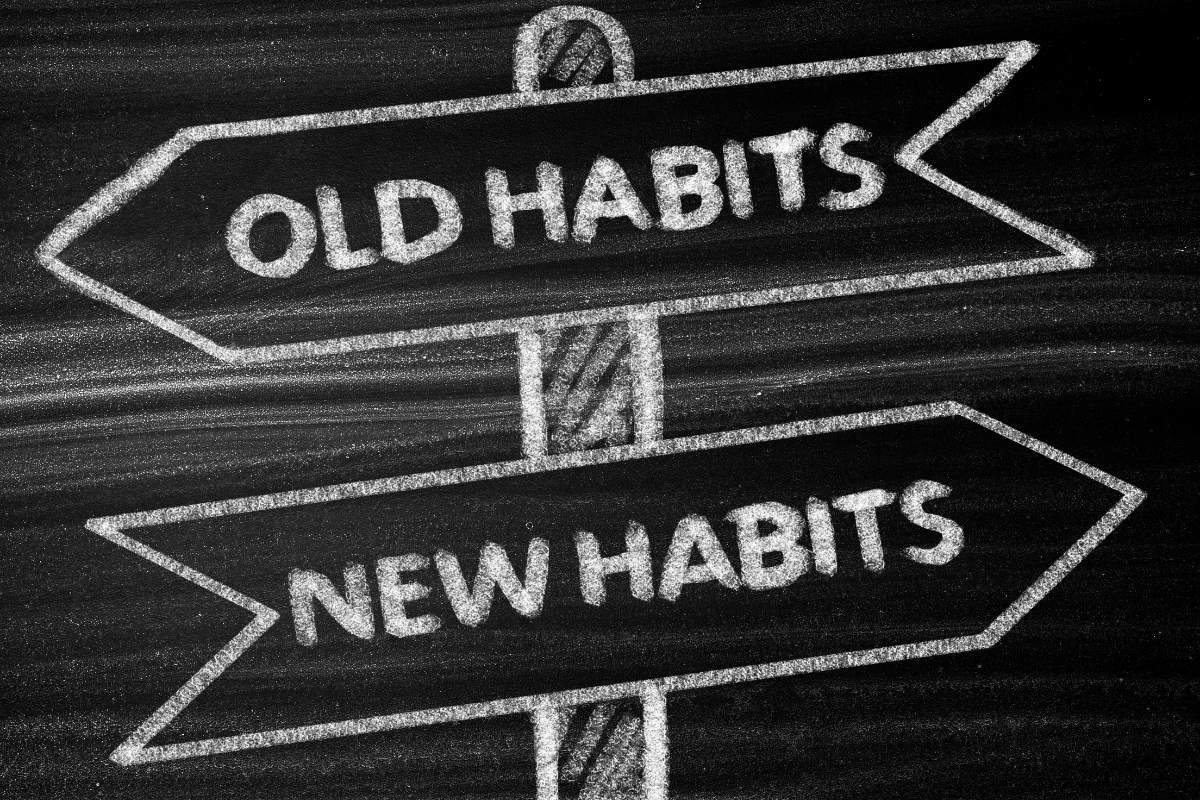
You can argue that life is a collection of successes and failures. Did you succeed or fail to stay as much as your mother and father’ expectations, to get the grades you needed at school, to get the job you needed, the promotion you needed, the social life you needed, the home you needed?
In fact, life is made up of days, with every day providing a number of probabilities to “succeed” or “fail.” Do you succeed or fail to get away from bed when your alarm goes off? Do you succeed or fail to suit some motion into your day? Do you succeed or fail to cook dinner dinner somewhat than decide up takeout (and if you happen to cooked, was that meal a cooking success or failure? Did you succeed with going to mattress on time as a substitute of studying simply ONE extra chapter of your ebook or watching simply ONE extra episode of that present that has you hooked?
I believe I our concepts about what means success and what means failure could be main obstacles to forming habits that assist our well being and well-being, in addition to obstacles to untangling ourselves from habits that aren’t supporting our well being and well-being. The excellent news is that mindfulness helps behavior change by serving to you keep away from these obstacles.

Bringing consciousness to your present habits
Mindfulness is famously outlined by Jon Kabat-Zinn as “paying consideration in a specific means: on goal, within the current second, and non-judgmentally.” More often than not, we’re not within the current second. We’re on autopilot, going by means of the motions of life — consuming, driving and even speaking — whereas our minds are busy rehashing the previous or worrying concerning the future.
So how does this apply to each day dwelling, and forming habits?
Practising mindfulness makes you extra conscious of your ideas, emotions, behaviors and habits, which is why the “nonjudgmentally” half is vital — odds are you’re going to develop into hyperaware of elements of your self that you just’re not thrilled about.
Perhaps you understand you’re kidding your self about how typically you go to mattress on time, or what number of days embody some kind of bodily motion. Maybe you uncover you eat mindlessly not sometimes, however at nearly each meal.
Feeling judged — even if you’re the choose — can result in disgrace and guilt, neither of that are efficient motivators for optimistic change. However you’ll be able to observe noticing your judgments as they pop up, then mood them with kindness, curiosity and acceptance.
Kindness and curiosity enable you determine, discover and perceive what might need led to the thought or habits you may really feel judgmental about. For instance, perhaps you ate the entire pint of ice cream since you had been feeling deeply anxious or lonely. While you’re senseless, there’s no room for curiosity—or for development and alter.
Acceptance merely means acknowledging that no matter you might be considering, feeling, doing or experiencing is how it’s within the current second. This helps you keep away from losing power beating your self up or wrestling with denial so you’ll be able to as a substitute discover the way to make optimistic adjustments.

Beginning once more is the success
We will observe mindfulness in some ways, however mindfulness meditation is the “formal” approach to observe mindfulness. Not solely is mindfulness meditation a strong software that may assist enhance well being and well-being in numerous methods, however the very act of working towards this type of meditation is an exquisite metaphor for what occurs after we attempt to kind habits.
Should you’ve ever practiced mindfulness meditation, odds are you began by turning your consideration to your breath. (There are different methods to observe, however that is the commonest, particularly for newcomers.) You plan to maintain your consideration in your breath, somewhat than to let or not it’s hooked by ideas, however how does that work out. Not effectively, since you all of the sudden discover that you just’re occupied with a dialog you had yesterday, what you intend to make for dinner, or that lodge reservation you’ll want to make for an upcoming journey.
Your thoughts wandered, as a result of that’s what minds do.
So a basic a part of working towards mindfulness meditation is noticing when your thoughts has wandered and bringing it again to your breath. And doing it once more, and once more, and once more…with out judgement.
It’s not a failure when your thoughts wanders — it’s a success if you seen that your thoughts has wandered and you come back it to your breath.
You might need some meditation classes the place your thoughts wanders much less, others the place it wanders extra. Typically, there no rhyme or motive. Different occasions, you come into your meditation throughout a tricky day, and it’s no marvel that your thoughts was in all places.
Regardless of how your session goes, you carry your thoughts again to the current second, to your breath, non-judgmentally. That may be a vital notion for being aware and for working towards meditation, but in addition for any form of behavior formation.

Non-judgment as a motivating drive
While you got down to kind a brand new behavior (or unform an previous behavior) it’s not about accumulating an unbroken string of doing (or not doing) the habits that types the behavior. That’s unrealistic, since you’re human and you aren’t excellent, as a result of no human is. We’re messy and flawed, and that’s lovely. We’ve good days and unhealthy days and life throws us surprising curveballs. As a result of that’s life.
Every time you wander from the trail of your new behavior, it’s successful if you return.
Some individuals discover it comparatively simple to kind habits. They determine, “I’m going to go for a stroll on daily basis,” and so they do it.
Different individuals may determine the identical factor and stroll on daily basis for per week. However then they miss a day. In the event that they outline and internalize that as a failure, it could possibly make it a lot more durable to get again on observe.
Let’s say you say to your self, “I missed a day of strolling. Clearly I’m a failure and a loser.” Properly, that’s not type, and it definitely doesn’t really feel good. Odds are it’s additionally going to make you need to stick your head within the sand to attempt to block out emotions of disgrace, which makes it more durable to renew the behavior.
Nonetheless, you might say to your self, with acceptance, kindness and non-judgment, “Oh wow, I used to be actually nice with this new behavior for per week and now I’ve missed a couple of days. However in the present day’s a brand new day, and I’m going to begin once more.” That’s the success. It’s the restarting that’s the success.
Curiosity comes into play if you discover why you bought off observe. Have been you sick? Did you prioritize one thing else? Did you overlook (as can occur with new habits)?

Sustaining habits for the long run
Even expert mindfulness meditators with years — or a long time — of observe underneath their belts expertise wandering thoughts. Even individuals who have maintained a behavior for years — or a long time — will expertise days (or weeks, or longer) when their behavior falters.
The longer you observe mindfulness meditation, the better it turns into to note that your thoughts wandered. That too is successful, as a result of meaning you’re constructing consciousness. The extra you observe, the extra your consciousness of your thoughts builds. Then, when your thoughts does wander, it doesn’t wander very far earlier than you discover and are in a position to carry it again to the article of your consideration.
(Should you’ve had the quite common expertise of realizing that your thoughts has been of in LaLa land for minutes, for half hour an hour, perhaps for longer, and you actually didn’t even discover, then you’ll be able to see how significant it’s to note extra rapidly after which select if you wish to be within the current second, or if you happen to do need to daydream. As a result of typically daydreaming is precisely what you need to do.)
And equally, when establishing or sustaining a behavior, the habits that’s the bottom of the behavior turns into extra ingrained (extra ordinary). It’s can really feel extra pure to proceed to take care of the behavior. Nonetheless, as I typically inform my purchasers, even well-established habits must be nurtured and cared for. Sort of like backyard crops — you will have to be extra intentional about their care after they’re younger, however they’ll at all times want some care.
In each instances (meditation and behavior upkeep), non-judgment, acceptance of what’s taking place within the second, and honoring your very human imperfections, can assist you come back to doing what’s vital to you.
Carrie Dennett, MPH, RDN, is a Pacific Northwest-based registered dietitian nutritionist, freelance author, intuitive consuming counselor, creator, and speaker. Her superpowers embody busting diet myths and empowering ladies to really feel higher of their our bodies and make meals decisions that assist pleasure, diet and well being. This submit is for informational functions solely and doesn’t represent individualized diet or medical recommendation.
Searching for 1-on-1 diet counseling? Carrie provides a 6-month Meals & Physique program (intuitive consuming, physique picture, mindfulness, self-compassion) and a 4-month IBS administration program (low-FODMAP food regimen teaching with an emphasis on rising meals freedom). Go to the hyperlinks to be taught extra and ebook a free intro name to see if this system is an effective match, and if we’re an excellent match!


